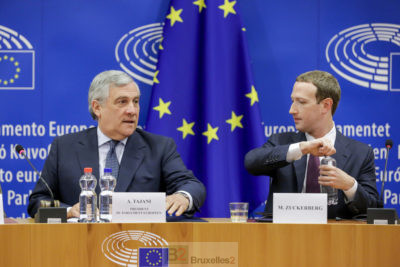Zuckerberg in the European Parliament: disappointment and frustration. The mea culpa is no longer enough

(B2) As expected, before MEPs, Mark Zuckerberg apologized for Facebook's failings. Cambridge Analytica scandal obliges. However, it is a particularly harsh taste that remains. The hour and a half of hearing did not yield any concrete answer
The CEO of Facebook spoke on Tuesday, May 22, before the leaders of the political groups in the European Parliament. Initially scheduled behind closed doors, the hearing which was held at the end of the afternoon was finally broadcast in streaming. What could have been a success of the European Parliament ended up leaving a bad taste with everyone, mainly due to the format chosen by the president of the assembly (read: Zuckerberg prefers a semi-camera to democratic debate). The MEPs present in this Conference of Presidents were left unsatisfied, not getting an answer to most of their questions. After a few minutes of protest, the American promised to respond " individually and in writing to each question » posed. In addition, Facebook executives will still be heard in a few days in a parliamentary committee.
Un mea culpa become habitual
Fake news, foreign interference in elections, or developers misusing personal information, that's the panoply of Facebook's failings. " It was a mistake, and I'm sorry admitted Mark Zuckerberg, founder of the social network, reciting a mea culpa already heard last month, before US lawmakers. " It has become apparent over the past two years that we have not done enough to prevent the tools we have created from being used for harmful purposes as well. As for the Russian interference, Facebook had been too slow to identify it" in the 2016 US presidential election.
Some good questions from MPs
Excuses are not enough
« You've already apologized several times and it's only May. How many times are you going to have to do this? » asked Belgian MEP Guy Verhofstadt ironically. " Are you really capable of improving your platform? ". The questions from MEPs were many, relating to the Cambridge Analytica scandal, the protection of private data, fake news, censorship.
The principle of free competition called into question
Another aspect highlighted, the monopoly of the social network and its compliance with tax legislation. " Are you ready to split whatsapp and messenger messenger activity of the two social networks Facebook and Instagram, asked G. Verhofstadt. The leader of the European People's Party (EPP), Manfred Weber, pointed to the need " to break the monopoly " from Facebook. " Are you ready to open your books to European anti-trust authorities? ». For the Greens, Philippe Lamberts insisted in particular on the tax issue calling on Mark Zuckerberg to stop raising his taxes in Ireland (where they are low taxed) and to publish details of its tax operations and arrangements.
Unconvincing answers
In the posture of the perfect little student to whom we teach a lesson, Mark Zuckerberg, weaved between the questions that were too difficult, preferring to choose his battlefield.
Cambridge Analytica bis? Impossible !
The good news about what happened with Cambridge Analytica is that the changes made within the social network in 2014 would prevent a " repeat promised Mr. Zuckerberg. " An application developer would not have access to this level of data since 2014. But since a number of applications were using our system in 2014, it is important to review all these applications. »
The fight against fake news with external verifiers
Differentiating between those who share false information voluntarily and those who do so unintentionally, it is with third-party verifiers that Facebook wants to fight against fake news. " These verifiers can demonstrate that such or such information is erroneous. We will need partners country by country, language by language... We still have a lot of work to do ».
Fake accounts: only 10% still exist
As for fake accounts, it should now be “ less than 10% ". " 180 million fake accounts and often within minutes of entering the system ”, have been deleted.
European elections, the arms race is on
Mark Zuckerberg says his company is working with European governments in view of the upcoming elections. " Our adversaries, especially on the election side - the people trying to interfere - will have access to the same AI tools that we will, so it's an arms race, and we're constantly going to work to stay ahead. »
Artificial intelligence against hate speech
« Speeches that are related to hatred or violence have nothing to do with our network. We have teams in place to handle this stuff. We have tools in place to sound the alarm much earlier. Our artificial intelligence system allows us to eliminate 95% of terrorist content even before our community reports this content to us. »
GDPR in global application
Faced with the entry into force of the new European data protection regulation (GDPR). Facebook will be there, assures his boss. “A team is currently working on it. » And European regulations should also be applied in the rest of the world. " We will submit even more to these severe rules “In particular the possibility of erasing its history in the same way as one can erase its “cookies” on the internet, he promises.
Investments in Europe
« It will take time to deal with all the changes to be made. But I am committed to doing it right and making the necessary investments to keep people safe. Among these investments, the doubling of employees assigned to security, to reach 20.000 by the end of the year.
Taxes paid according to the rules
« We pay the taxes that national laws impose on us. » Facebook " employs 10.000 people across Europe, has two data centers, including one to come to Denmark in 2020 he justified. But the creator of social media has tried to minimize the weight of the American company.
(Leonor Hubaut)
Listen to the successive interventions (MP3)


